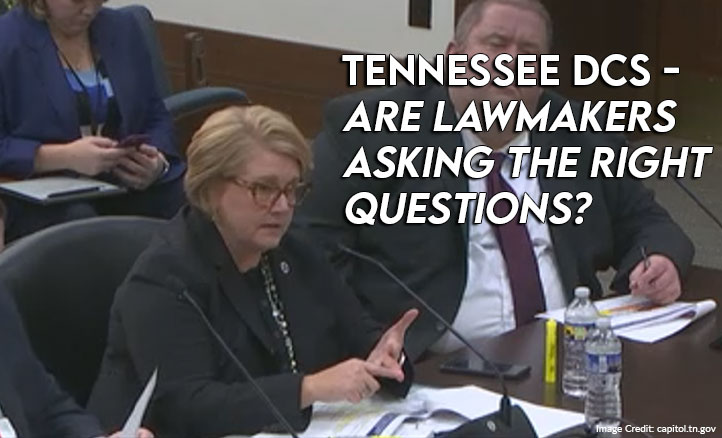Image Credit: capitol.tn.gov
The Tennessee Conservative [By Paula Gomes] –
Are Tennessee lawmakers asking the right questions of the state’s Department of Children’s Services given its long history of failures?
During the December 14, 2022 legislative hearing, Commissioner Margie Quin stated that she was going to engage – and pay with Tennessee taxpayer dollars – the State of New Jersey to train Tennessee DCS staff in a bid to improve the running of the agency.
New Jersey, perhaps the bluest state in the nation, has almost nothing in common with Tennessee politically or demographically. Quin did not disclose to the committee that New Jersey is still under federal court oversight of its agency and has been for twenty years.
Tennessee DCS continuously complains about caseloads and case worker turnover. The only remedy that they can muster is an increase in pay. No one asks the question: What do they do with their time?

The agency reports about 3,900 employees and the report states that 71% of those are caseworkers. If each case worker has 20 cases, the math shows that 2,769 workers would be reaching 55,380 cases. DCS has admitted that often a single case includes more than one child. Using a conservative estimate of two children per case, the total is 110,760 children. DCS reports that only 8,200 of those children are in foster care.
In January 2019, then-commissioner Jennifer Nichols admitted that children were staying up to six months longer in foster care due to case workers quitting. Children in state custody suffer from staff incompetency and turnover at an agency whose sole purpose is to protect and serve children.
Sources with decades of experience with DCS say that lawmakers should ask the following questions:
• How long are children staying in foster care, and is there anything in the system that can be corrected to expedite the children’s ability to return home when removal is necessary?
• Are children being removed who could safely remain in the home, if services were provided such as drug treatment programs, food and housing assistance, and mental health treatment?
• Is the agency conducting any time-productivity studies to see what case workers spend their time on? Are they loaded down with paperwork that takes away from their case management?
• Are there any impediments to family stabilization or reunification that are created by the integration of the social services aspect of child welfare and the antagonisms between the agency and the family in the legal system?
• Regarding the privatization of case management, will there be any conflicts of interest in private case management services working on family reunification while they are profiting everyday if the child remains in privatized foster care?
Statistics show that Tennessee has a population of seven million and about 1.5 million are under the age of 18. Eighteen percent of those children are living in poverty (270,000 children). The greater percentage of children in poverty are in rural counties. Thirty-five percent of children are living in single parent households. What we don’t know is how many children are living in households where a parent suffers from substance abuse, since it is never reported unless the parent becomes involved in the legal system.
If poverty, single parent households, and substance abuse are issues that are more likely to place children at risk of abuse or neglect, then families who have services are more likely to create a healthy environment for raising children.

Sources tell us that the state legislature does not want to engage in a conversation which would raise the quality of life for children in Tennessee; they merely want to perpetuate a social engineering project that does not work.
Families have no effective way of communicating with the department or their lawmakers to complain about the agency’s draconian solution of child removal. Our sources report that multiple families have filed complaints with DCS’s central office with no response. In January 2021, eight families went to a legislative committee meeting and they were refused an audience.
In February 2018, Congress passed the Family First Preservation and Services Act of 2018 (now called the Family First Act) which provided for a shift in the administration of Title IV E funding allowing families to stay together and receive services as opposed to requiring child removal before federal funds were collectible. This was a major change in federal funding. Tennessee has yet to adopt a Family First program which would benefit families and children and save taxpayers money.

About the Author: Paula Gomes is a Tennessee resident and reporter for The Tennessee Conservative. You can reach Paula at paula@tennesseeconservativenews.com.



4 Responses
Fully support external agency desk audits with results reported to an oversight entity like an IG who can make and enforce required changes.
To many children fall through the cracks and for every success there are numerous failures. You can continue to throw money at an ineffective and inefficient program but that doesn’t mean anything is going to change. From personal conversations I’ve had, the caseworkers are overworked yet underpaid with high turnovers because higher numbers look better on the reports the agency will use to justify asking for more money…. My question is, where does the “increase” in money go? It seems using the money to put more boots on the ground to help with the caseworkers workload would be more prudent that hiring additional administrative staff to review the reports that the higher ups should be doing. Moral is at an all time low. We all know the need for this type of agency but there certainly needs someone who will dedicate their time to see the agency is the effective agency for the safety of those children without a voice.
DCS has been in existence for about 27 years, and they still can’t get in gear. Just doing the simple math of dividing the DCS figure of about 8,500 children in custody on any given day, divided by a budget of about a billion dollars gives of figure of about $117,000 per child, per year.
As mentioned in the article, DCS is overloaded with administrative personnel. Granted, some of these personnel are sorely needed to simply keep the disaster of TFACTS operating, plus eyes to look over some of the contract agencies. But why does DCS need approximately 10 layers of management?
I believe a better streamlined agency could deal better with the challenges.
You hit the nail on the head with the privatization of case management. it creates a direct conflict of interest between the for-profit private company and the families it serves. They are receiving a per diem per day per child that remains in their care, but they are also paid to provide reunification services or appear they are providing those services. Working with other families in my community and throughout Tennessee the conflict of interest is preventing and extending the dates of reunification for TN families.